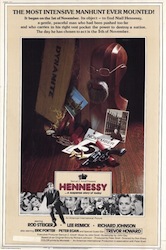fiction.wikisort.org - Movie
Hennessy is a 1975 British thriller film directed by Don Sharp and starring Rod Steiger, Trevor Howard, Lee Remick, Richard Johnson, Peter Egan, Stanley Lebor and Sir Patrick Stewart, the latter in his film debut.[1][2]
| Hennessy | |
|---|---|
 | |
| Directed by | Don Sharp |
| Screenplay by | John Gay |
| Produced by | Peter Snell |
| Starring | Rod Steiger Lee Remick Richard Johnson |
| Cinematography | Ernest Steward |
| Edited by | Erik Boyd-Perkins |
| Music by | John Scott |
Production company | Hennessy Film Productions |
| Distributed by | American International Pictures |
Release date |
|
Running time | 103 min |
| Country | United Kingdom |
| Language | English |
Plot
After the death of his family during a riot in Belfast, Niall Hennessy comes up with a plan to blow up the British Houses of Parliament.[3]
Cast
- Rod Steiger − Niall Hennessy
- Lee Remick − Kate Brooke
- Richard Johnson −Insp. Hollis
- Trevor Howard − Cmdr. Rice
- Peter Egan − Williams
- Eric Porter − Tobin
- Ian Hogg − Gerry
- Stanley Lebor − Hawk
- John Hallam − Boyle
- Patrick Stewart − Tilney
- David Collings − Covey
- John Shrapnel − Tipaldi
- Hugh Moxey − Stephen Burgess (M.P.)
- Margery Mason − Housekeeper
- Paul Brennan − Maguire
- Paul Blake − Rally Leader
- Patsy Kensit − Angie Hennessy
Production
The film was a co production between Peter Snell and American International Pictures. The original director was to be John Guillermin but by the time the producers raised finance he was on another project so they approached Don Sharp, then directing Callan.[4]
Production started in February 1974 and finished in September.[5][6]
Footage of Queen Elizabeth
The film contained footage of Queen Elizabeth II speaking at the State Opening of Parliament and apparently reacting to something happening in the House of Lords, taken in 1970. The clips were purchased by AIP from Movietone News and incorporated in the film. Buckingham Palace consented to use of the clip in the film but later said this was a misunderstanding as to the way the news footage would be used in the film and they would not do it again.[7][8]
Release
The British Board of Film Classification initially refused to classify the film because of the footage. Producer Samuel Z. Arkoff managed to get it passed by adding a disclaimer stating that the British Royal Family had not participated and footage of the Queen was from newsreel and by cutting a six-second sequence where the Queen appeared to react to the explosion.[7]
The Rank Organisation then refused to screen the film in its Odeon Cinemas, citing commercial reasons. EMI also refused to distribute it, with Chairman Sir Bernard Delfont claiming it was too sympathetic to the IRA to be shown at that present time.[8] Critics such as Alexander Walker protested against this.[9]
As a result, it was only shown at a small number of independent cinemas.[10]
Critical Reception
The Guardian called it "quite a good thriller".[11] The Los Angeles Times called it "routine but competent."[12]
References
- Variety film review; 23 July 1975, page 20.
- Vagg, Stephen (27 July 2019). "Unsung Aussie Filmmakers: Don Sharp – A Top 25". Filmink.
- BFI.org
- Sharp, Don (2 November 1993). "Don Sharp Side 6" (Interview). Interviewed by Teddy Darvas and Alan Lawson. London: History Project. Retrieved 14 July 2021.
- anonymous (1974). "no title". Journal: Society of Film and Television Arts. 1–2: 20.
{{cite journal}}: Cite uses generic title (help) - Great Scenes on Film in 'The Movies' Haber, Joyce. Los Angeles Times 13 Feb 1974: e7.
- News Clip of Queen Causes Film Flap Los Angeles Times 7 June 1975: f18.
- Royal flush The Guardian 24 June 1975: 15.
- Massey, Patrick (13 July 1975). "Movies: Critics boo British ban on 'Hennessy'". Chicago Tribune. p. e15.
- Kevin Rockett (1996). The Irish Filmography: Fiction Films, 1896-1996. Red Mountain Media. p. 184. ISBN 0952669803.
- "Offer they couldn't defuse: Derek Malcolm reviews new films". The Guardian. 17 July 1975. p. 10.
- Champlin, Charles (30 July 1975). "MOVIE REVIEW: 'Hennessy' Has Royal Look 'Hennessy' Gets Royal Treatment". Los Angeles Times. p. e1.
External links
Другой контент может иметь иную лицензию. Перед использованием материалов сайта WikiSort.org внимательно изучите правила лицензирования конкретных элементов наполнения сайта.
WikiSort.org - проект по пересортировке и дополнению контента Википедии